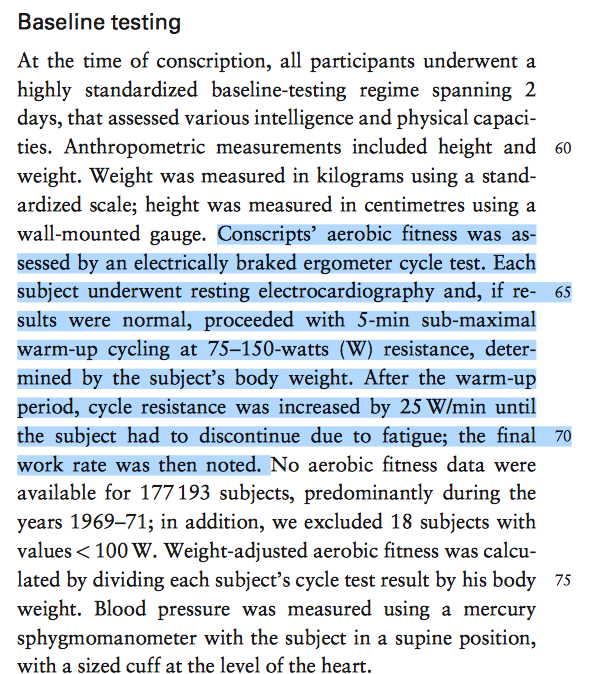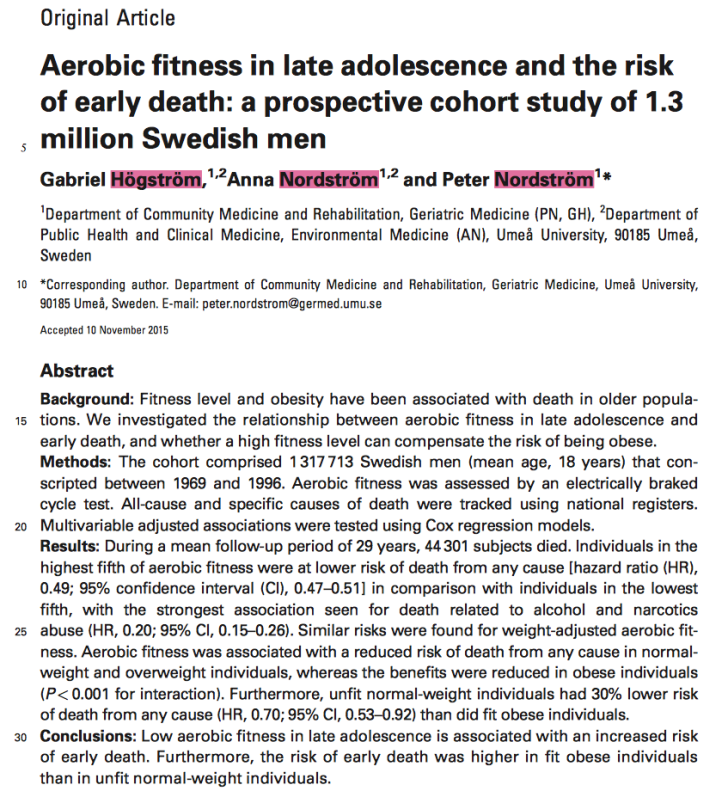Reality: Claim a myth.
In this 29-year long study, fitness was only assessed at the outset, when the 18-year old men were conscripted into the Swedish army.

Sorry. Fitness level at 18 years of age is not some indicator of fitness in subsequent decades. The rest of the study is not worth looking at. Garbage in, garbage out.
The media release and abstract is below.
###
A new study, published today in the International Journal of Epidemiology [1], has dismissed the concept of ‘fat but fit’. In contrast, the results from the new study suggest that the protective effects of high fitness against early death are reduced in obese people.
Although the detrimental effects of low aerobic fitness have been well documented, this research has largely been performed in older populations. Few studies have investigated the direct link between aerobic fitness and health in younger populations. This study by academics in Sweden followed 1,317,713 men for a median average of 29 years to examine the association between aerobic fitness and death later in life, as well as how obesity affected these results. The subjects’ aerobic fitness was tested by asking them to cycle until they had to stop due to fatigue.
Men in the highest fifth of aerobic fitness had a 48 per cent lower risk of death from any cause compared with those in the lowest fifth. Stronger associations were observed for deaths related to suicide and abuse of alcohol and narcotics. Unexpectedly, the authors noted a strong association between low aerobic fitness and also deaths related to trauma. Co-author Peter Nordström has no explanation for this finding: “We could only speculate, but genetic factors could have influenced these associations given that aerobic fitness is under strong genetic control.”
The study also evaluated the concept that ‘fat but fit is ok’. Men of a normal weight, regardless of their fitness level, were at lower risk of death compared to obese individuals in the highest quarter of aerobic fitness. Nevertheless, the relative benefits of high fitness may still be greater in obese people. However, in this study the beneficial effect of high aerobic fitness was actually reduced with increased obesity, and in those with extreme obesity there was no significant effect at all.
With the limitation that the study cohort included only men, and relative early deaths, this data does not support the notion that ‘fat but fit’ is a benign condition.
###

@jmurphy strange how this totally conflicts with the obesity ‘paradox’ which quite definitively shows that overall premature morbidity is lower in the >25 BMI groups and larger in the <18 BMI. In other words, weight is not a good morbidity predictor excluded the extremes ofcourse.
Furthermore again we come to the definition of 'obese'. A very flexible goalpost if i ever saw one. Fitness is just a random definition. Compared to the hunter gatherers even the most fit person nowadays would never be able to compete or even keep up with them.
All which isn't needed is superfluous in nature. Reason why humanity becomes ever less 'fit' and more 'unfit'. If you want to undo that do away with all machinery, vehicles, computers whatever and throw humanity back to 10's of 1000's of years ago.
You'll be amazed how 'fit' we become.
“Fitness level at 18 years of age is not some indicator of fitness in subsequent decades”
“This study … followed … men … for … 29 years”.
Uh, there’s your subsequent decades right there.